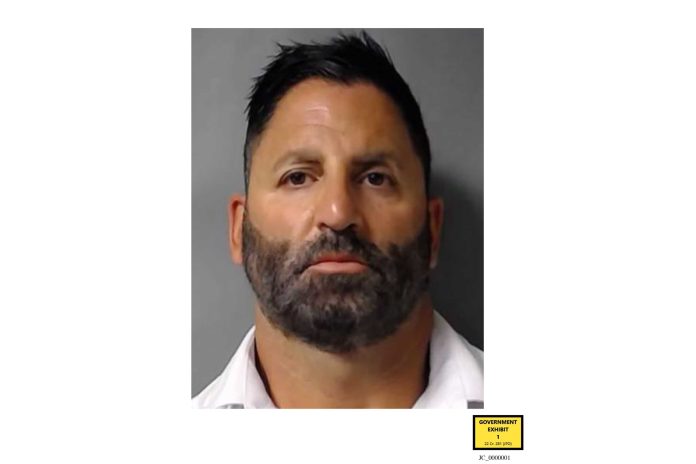
By LARRY NEUMEISTER, JIM MUSTIAN and JOSHUA GOODMAN
Associated Press
NEW YORK (AP) — A federal judge Wednesday sentenced a longtime U.S. Drug Enforcement Administration agent to four years in prison for leaking DEA intelligence to defense lawyers in a $100,000 bribery scheme that prosecutors said jeopardized drug cases and the lives of confidential informants.
John Costanzo Jr. was found guilty last year of bribery and honest-services wire fraud, joining a growing list of DEA agents convicted of federal crimes. Another former DEA supervisor, Manny Recio, is scheduled to be sentenced next month in the same case.U.S. District Court Judge Paul Oetken, in handing down his sentence, noted that the 49-year-old Costanzo was “especially culpable” as a supervisor because he “knew what he was doing was wrong.”
Costanzo, addressing the judge before sentencing, expressed regret for his actions. “This is my cross to bear,” he said. “I will try to find a silver lining in all of this.”
Prosecutors urged the judge to sentence Costanzo to at least seven years behind bars, saying he abused the tradecraft he mastered as a narcotics investigator steeped in the world of money laundering. He worked in supervisory roles in Miami and later at DEA headquarters outside Washington, D.C.
“Costanzo acted purely out of greed,” prosecutors wrote in court papers. “He used his network, connections and skills to hold himself above the law and make money for leaking law enforcement secrets, undermining everything he purported to stand for.”
Much of the case turned on text messages and wiretapped phone calls between Costanzo and Recio, who remained close after Recio retired from DEA in 2018 and began working as a private investigator for Miami defense lawyers.
Prosecutors allege that attorneys David Macey and Luis Guerra bankrolled the bribery scheme and used the leaked information to approach new clients facing federal drug charges. Macey and Guerra have not been charged but prosecutors in January asked the court for permission to access normally privileged communications between Recio and the attorneys as part of what they described as an “ongoing” investigation.
The DEA did not respond to a request for comment. Costanzo’s sentencing came less than two weeks after a federal jury in Buffalo, New York, convicted another veteran DEA agent of obstruction of justice and lying to federal agents in a sprawling corruption case.
Over the course of a year, Recio repeatedly asked Costanzo to query names in a confidential DEA database to keep abreast of federal investigations that would interest his new employers. The two also discussed the timing of high-profile arrests and the exact date in 2019 when prosecutors planned to bring charges against businessman Alex Saab, a top criminal target in Venezuela and suspected bag man for the country’s president, Nicolas Maduro.
In exchange, prosecutors said, Recio secretly funneled bribes to Costanzo, including plane tickets and a $50,000 down payment on a condo in suburban Coral Gables.
The conspiracy relied on middlemen, including Costanzo’s father, himself a retired and decorated DEA agent who prosecutors said lied to the FBI. Prosecutors said Costanzo and Recio also used sham invoices and a company listing its address as a UPS store to disguise the bribe payments while deleting hundreds of messages and calls to a burner phone.
In requesting a sentence of probation, Costanzo obtained letters of support from several former colleagues, including three current DEA agents and supervisors who described him as a dedicated public servant, generous friend and expert in illicit finance.
Costanzo’s attorney said his client’s only ambition was to follow in the footsteps of his father, John Costanzo Sr., a retired DEA agent who served for years in Italy and who is now battling pancreatic cancer.
“Not being present for his hero’s waning days and final months would break John forever,” defense lawyer Marc Mukasey argued in a pre-sentencing memo. “That is a punishment he does not deserve.”
Prosecutors, however, painted a less charitable view of the father-son relationship, pointing to the elder Costanzo’s role as a conduit for a $50,000 bribe payment that was used to purchase a Miami townhouse.
“Let this be a message to all public officials who are tempted to profit illegally from their service — there will be serious consequences,” Manhattan U.S. Attorney Damian Williams said.



















